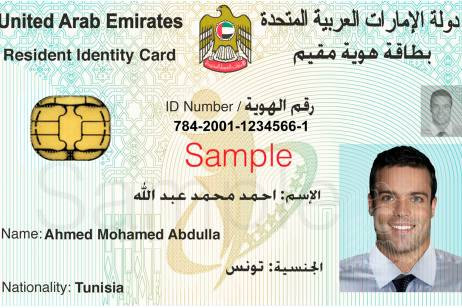The
Ministry of Labour will replace the old plastic labour cards and paper
employment contracts with electronic ones starting July 13, a ministry
official said.
Humaid Bin Deemas Al Suwaidi, Assistant Undersecretary for Labour
Affairs, said at a press conference in Dubai that the new process saves
time and effort for the employer who is applying and creates an
integrated database with the Ministry of Interior and the Emirates
Identity Authority.
Once the e-card and e-contract are issued, a copy is sent to the
Ministry of Interior, Emirates ID Authority and General Directorate of
Residency and Foreigners Affairs to complete the procedures.
The ministry has already started a trial phase on July 1, which will
continue until July 13. He said this will help the ministry iron out any
issues that might come up before the official launch date.
E-cards and e-contracts will be issued electronically within 48 hours
from the date of submitting the application on the ministry's e-portal,
eNetwasal. The employer first gets an initial approval for a work
permit, which allows the worker to enter the country from the Ministry
of Labour by applying through Tas'heel service centre.
After the worker enters the country, the employer should apply for
the e-card and e-contract through eNetwasal within 60 days from the
worker's entry or else the employer will face a fine of Dh1,000 for each
month he is late, Al Suwaidi said.
The same process applies for plastic labour cards that are due for
renewal. They will be replaced by electronic ones. He explained that the
e-contract and e-card are crucial to ensure that the rights of both
parties - the worker and the employer - are protected.
If an employer does not apply for the card and contract within the
60-day period and does not provide a valid excuse, he will be fined and
the Ministry of Labour will stop issuing any permits to that person.
"The ministry will stop issuing any new work permits to uncommitted
employers until they obtain the electronic labour cards and employment
contracts, or provide rational justifications for not issuing them on
time," Al Suwaidi said.
He said that the employer has no excuse to be late, as the Ministry
of Labour receives a notification from the Ministry of Interior as soon
as the worker arrives in the country, and then it starts sending the
employer SMS messages notifying him to apply for the e-card and
contract. "We do this multiple times."
Al Suwaidi said that "instead of having to go the post office to
receive a plastic card and a paper contract, the employer can just print
the e-card and e-contract once issued from eNetwasal. The worker also
has access to his documents and can re-print them if they are lost".
Fees will remain the same, which vary according to the establishment's category as per the ministry's classification system.
Now the only thing a worker needs to carry is the Emirates ID card as
it will be recognised as the official identification document. "It will
not be possible to get an Emirates ID card or residency visa issued
without the e-card and e-contract." "Our inspectors will now only check
for the Emirates ID card. They are equipped with readers that can read
the information on the embedded chip of the ID card." he said.
He urged employers to provide workers with their own identity cards
in case of questioning during labour inspections. Al Suwaidi added that
the new electronic labour card and employment contract are an
implementation of a decision issued by Saqr Gobash, Minister of Labour,
and is in line with the directives of His Highness Shaikh Mohammad Bin
Rashid Al Maktoum, UAE Vice-President and Prime Minister and Ruler of
Dubai, directives towards making Dubai a smart city. The new process was
approved after reviewing it with strategic partners such as the
Ministry of Interior and the Emirates Identity Authority, as well as
private company representatives.
According to ministry statistics, the Ministry of Labour issues an average of three million new/renewed labour cards annually.
Ninety-nine per cent of its services are available online








0 comments:
Post a Comment